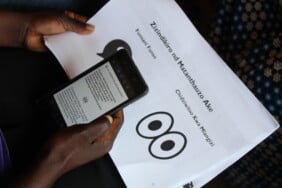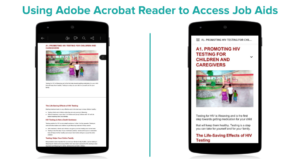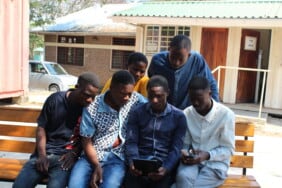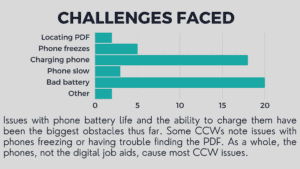Digitizing Job Aids for Offline, Mobile Use by Community Case Workers in Malawi
December 5th, 2023 | News
Since 2019, World Education has partnered with Adobe to advance the field of digital text readability. As part of this partnership, we have conducted field testing of Adobe’s Liquid Mode. Liquid Mode is a tool embedded in the Adobe Acrobat mobile application that reflows PDFs, making it easier for learners to read and engage with digital text on a mobile device as well as providing text personalization settings. Our contribution to this work is helping mitigate the challenges of reading digital text faced by adults who are dependent on their smartphones for accessing information.
Our current work involves updating and digitizing (in PDF) the materials that 1200 Community Case Workers (CCWs) rely on during their visits to families who have children living with HIV in Malawi. The CCWs are frontline case workers supported through the USAID/PEPFAR-funded Ana Patsogolo (“Children First”) Activity led by World Education. The digital job aids, designed for mobile offline use through the Adobe Acrobat app, are intended to ease updates, dissemination, and access to the important public health and social services information CCWs use in the field. As part of this work, the World Education team is collecting information on the challenges and benefits of this approach, with the goal expanding its efficacy to similar settings .
We began with exploratory inquiry between January and May 2023 to better understand the obstacles CCWs encountered when accessing information using paper-based job aids while working at the community level. Results from the questionnaire and focus groups indicated CCW openness to trying digital job aids and informed improvements to the existing content. Once we established the feasibility of replacing the printed paper copies of the job aids with PDFs accessed through their company phones, we launched a pilot field test from August through October 2023 in Machinga and Zomba districts of Malawi.

The goal of this small scale pilot was to understand the feasibility and usability of digital job aids by front line service providers. This pilot equipped 29 CCWs in these regions with updated, digitized versions of the paper job aids they use to provide services to caregivers who support children and adolescents living with HIV. These job aids cover topics ranging from HIV management, violence and abuse, household finances, and education support. For three months, CCWs used these digitized job aids, accessed on their phones through the free Adobe Acrobat Reader application, to support their communities and reported back to us on the successes and challenges they faced.
Preliminary results from the pilot show high-levels of adoption of the digital job aids in place of their paper counterparts. 21 CCWs (72%) in this pilot indicated that they now only use digital job aids for their work. CCWs noted that the digital job aids are easier to use and provide more confidentiality to caregivers. Confidentiality is a large concern that CCWs face as they provide services – not all families who receive services have publicly disclosed their HIV status and having the materials needed to provide services on CCW phones allows for discretion in service provision.
There are challenges with paper documents because storing them is difficult, and when it comes to confidentiality at a household, it is a challenge. It’s a big challenge for us to carry those papers rather than using digital tools.”

During the rollout, CCWs reported using the digital job aids over 1,300 times, nearly every day on average. They described the digital job aids as being easier to use given their portability, the speed with which they can access information, and the affordances of Liquid Mode functions. Others noted their ability to be more efficient with their time because they are not spending time flipping through the pages of the paper-based job aids. These early findings point to the potential of improved relationships and trust with the families served through more meaningful interactions.
The digital job aids have also reduced my time spent at households from 45 minutes to about 30 minutes. This has enabled me to visit more households. I can now visit 5 to 6 households per day from the 3 I used to visit when using the paper job aids.”

The CCWs still face struggles despite the benefits the digital job aids offer them. In Malawi, access to consistent power sources is a challenge in some rural communities, which can be addressed by installing solar panel chargers in the local health clinics where they report daily. In addition, participants reported struggles with their phones freezing due to minimal phone storage or their phones dying from not holding a consistent charge, even after using the solar chargers.

The value is clear: Digital job aids support CCWs to feel more confident to effectively do their jobs. To scale this work, we hope to partner with groups that can support upgrading the devices of CCWs to further their impact. Providing better phones to CCWs can increase their capacity to support families and children living with HIV.
World Education fosters enduring partnerships across regions and sectors to advance education outcomes for all. We offer education systems strengthening, program design and implementation, applied research and evaluation, capacity development, and policy development services.